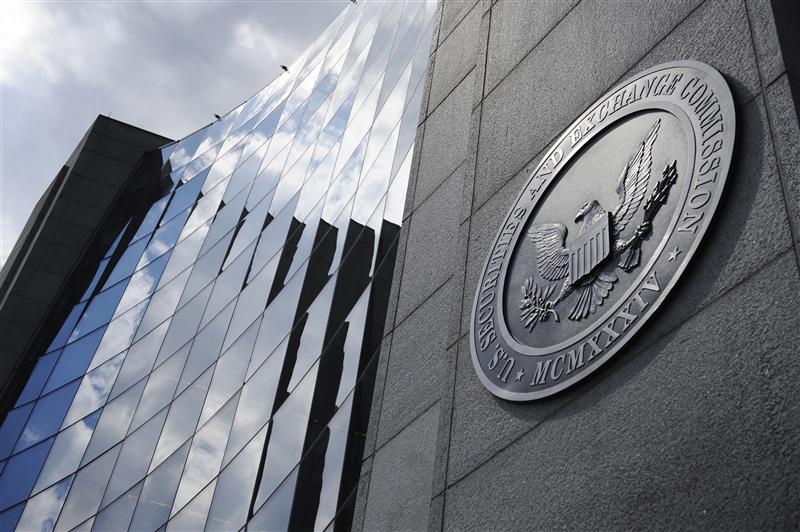

Caroline Crenshaw, who was nominated by President Donald Trump on Thursday to be a member of the Securities and Exchange Commission, would bring deep knowledge of both the agency and its landmark investment advice reform rule to the role.
Crenshaw would replace former member Robert Jackson Jr., who left the commission in February. Crenshaw, a former counsel to Jackson, was chosen to fill a Democratic seat.
Crenshaw has been at the agency since 2013. She also served as a counsel to former Democratic SEC member Kara Stein and worked in the Office of Compliance Inspections and Examinations and in the Division of Investment Management.
“She’ll bring a really deep knowledge of the building and the perspective of someone who’s worked on the staff for several years,” said Satyam Khanna, who served on Jackson’s staff with Crenshaw.
That background will give Crenshaw insight into often complex and almost always lengthy regulatory proposals.
“Knowing how a rule is built from the bottom up is going to be very valuable to her as a commissioner,” said Khanna, a resident fellow at the Institute for Corporate Governance and Finance at New York University Law School.
Crenshaw's most recent role, as Jackson’s counsel, put her in the middle of the SEC debate over the agency’s investment advice reform package that revolved around Regulation Best Interest, the new broker standard. Jackson voted against Reg BI, saying that it was too weak to protect investors from broker conflicts of interest.
If confirmed by the Senate, Crenshaw could help shape how the SEC enforces Reg BI, which most experts say will determine whether or not the measure is effective.
“Boy, does she know Reg BI,” said Barbara Roper, director of investor protection at the Consumer Federation of America. “She’ll have a unique ability to focus on how to deliver on the investor protection promise of Reg BI. She will always be thinking about what do we need to do to make sure investors are treated fairly.”
Some recent SEC commissioners also were Senate aides in addition to having worked at the SEC. Crenshaw never worked on Capitol Hill.
“She has deep experience in all of the policy matters before the commission but she’s not particularly political,” said Tyler Gellasch, executive director of the Healthy Markets Association. “I don’t expect she’ll be viewed as a partisan figure.”
Earlier this month, Trump renominated Peirce for a full five-year commission term. The fact that both a Republican and Democrat have been nominated at the same time may make the Senate confirmation process smoother for both of them.
“My hope is [Crenshaw’s] nomination will be paired with Hester Peirce’s, and the two will be considered by the Senate Banking Committee together and be confirmed,” Gellasch said.
A spokesperson for the committee said that a hearing date for the SEC nominees has not been set.
If the two SEC hopefuls are confirmed, the SEC would return to a full five-person panel, with three members appointed by Republicans and two appointed by Democrats. In addition to Peirce and Roisman, the commission currently includes Chairman Jay Clayton and Democratic member Allison Herren Lee.
Khanna, who used to work in the office next to Crenshaw's, praised her professionally and personally.
‘She's generous,” Khanna said. “She’s open-minded. She’s a dedicated friend.”
(This article has been updated to correct an error. A paragraph that misstated the professional experience of several recent appointees has been revised. InvestmentNews apologizes for the error.)

While industry statistics pointing to a succession crisis can cause alarm, advisor-owners should be free to consider a middle path between staying solo and catching the surging wave of M&A.

New joint research by T. Rowe Price, MIT, and Stanford University finds more diverse asset allocations among older participants.

With its asset pipeline bursting past $13 billion, Farther is looking to build more momentum with three new managing directors.

A Department of Labor proposal to scrap a regulatory provision under ERISA could create uncertainty for fiduciaries, the trade association argues.

"We continue to feel confident about our ability to capture 90%," LPL CEO Rich Steinmeier told analysts during the firm's 2nd quarter earnings call.
Orion's Tom Wilson on delivering coordinated, high-touch service in a world where returns alone no longer set you apart.
Barely a decade old, registered index-linked annuities have quickly surged in popularity, thanks to their unique blend of protection and growth potential—an appealing option for investors looking to chart a steadier course through today's choppy market waters, says Myles Lambert, Brighthouse Financial.
